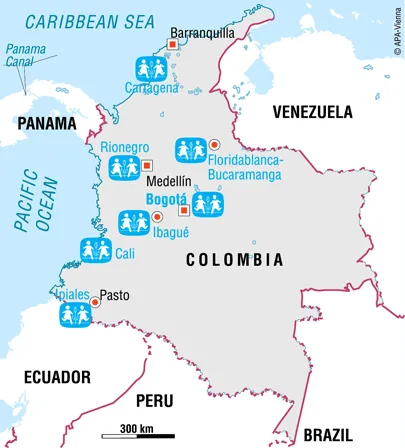
SOS relies on the kindness and generosity of Canadians to be able to provide a home for the most vulnerable children around the world.
By becoming a child sponsor you are helping an individual child in need.
(You will receive a Canadian charitable tax receipt)
Please help us ensure a loving home for every child. Sponsor a child in South America now.
SOS Children's Villages in Ibagué
In recent years, Colombia has been on a slow but steady course towards reducing poverty, and much has been achieved. However huge sectors of the population have still not benefited from this progress. Children from such families are the most vulnerable members of Colombian society.
SOS Children's Villages began its work in Ibagué in 1985, after a devastating volcanic eruption buried the city of Armero in an avalanche of mud. It is located about 50 km south of the disaster area.

The SOS Social Centre here offers a family strengthening programme, which aims to alleviate hardship in the community in a holistic and sustainable manner. Its services include a day-care centre, where children are looked after during the day by qualified staff so that working parents or single mothers can go out and make a living without having to worry.
For children who are no longer able to live with their parents, 18 SOS families can provide a loving home for up to 162 children. In each family, they live with their brothers and sisters and are affectionately cared for by their SOS mother.
Once the children are old enough to start school, the SOS Hermann Gmeiner School in Ibagué provides primary and secondary school education for up to 475 students. Children from the local community also attend the school, so the children from the SOS Children’s Village are therefore very much integrated into the community from a young age.
When young people from the children’s village are ready to leave their family in order to pursue further education or vocational training, the SOS Youth Programme offers them shared accommodation. With the support of qualified youth counsellors, they live with other young people here and learn to take responsibility, plan their future and prepare for independent adult life.
Informal work and the lack of security in times of financial crisis threaten the livelihoods of many families
Ibagué is the capital of the province of Tolima and is located roughly 200 km from the capital, Bogotá. The city has around 500,000 inhabitants and is an important commercial centre due to its central location between Bogotá and Cali. The region is also an important producer of coffee and rice, and it has become an increasingly big player in the nation’s textile industry.
Despite these factors, unemployment here was the highest in all of Colombia in the last decade, and the proportion of people without formal work is also large. Government programmes and incentives for micro-enterprises have helped to improve this situation but, at around 18 per cent (or 90,000 people), unemployment remains high. Ibagué is very much a divided city: while the north is modern, with an increasing number of shopping malls, hotels and apartment buildings, the south is still dominated by the so-called “popular neighbourhoods”, where poverty is widespread.
Children need protection from the violence that surrounds them
Child labour remains a very serious problem, particularly in these popular neighbourhoods, with at least ten per cent of children estimated to be working, e.g. as street vendors, domestic employees or in agriculture. Poverty is one of the main reasons why parents make their children work, but it is also a cultural problem. Many parents believe that working from an early age is “formative” and will help children learn to be adults.
Often, the work children do seriously endangers their health and interferes with their education. Furthermore, it exposes children to the risk of sexual exploitation. Many children and adolescents in the region are also recruited by armed guerrilla insurgent groups. In order to protect children from experiencing such violence, it must be ensured that they stay in education so that they can break the cycle of poverty, learn a profession and become successful adults. In order to guarantee this, parents need to be supported and educated, too.
Our Impact
Image

SOS Social Centres in Colombia aim is to help families, in particular women and children, living in communities neighbouring the SOS Children's Villages to gradually escape from poverty, and to help young people become self-reliant. |
2 SOCIAL CENTRES | 836 Beneficiaries |
Image
The SOS Children's Village in Colombia provides loving homes to orphaned and abandoned children |
1 VILLAGES | 104 Orphaned and Abandoned Children |
Image
The SOS Youth Facilities in Colombia provides youth with a loving environment where they learn to transition into independent living and to expand their education |
2 YOUTH FACILITIES | 43 Youths in our Care |
Our Impact

